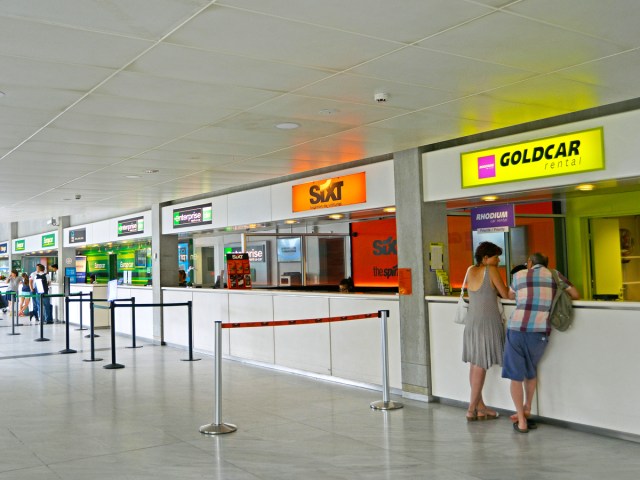Renting a car might feel like an intimidating way to explore a new country — especially if you don’t know how to drive stick shift or if you’ll be driving on the left side of the road. Even pumping gas abroad can be an adventure. But there are certain benefits that come with renting a car, from being able to reach offbeat destinations with fewer crowds, to avoiding lugging heavy luggage through train stations and operating on your own schedule. Prepare yourself ahead of your next international trip with these helpful tips for renting a car abroad.
Check if You Need an International Driving Permit

Before you book a vehicle, you should determine if your U.S. driver’s license is enough to get behind the wheel. The country you’re visiting may require an International Driving Permit (IDP), and you run the risk of being turned away at the checkout counter if you don’t have one. Check with the embassy of your destination country before you depart, and if an IDP is required, make plans to obtain one either in person or by mail.
The U.S. Department of State has authorized the American Automobile Association (AAA) and the American Automobile Touring Alliance (AATA) to issue IDPs. Americans with a valid driver’s license must provide a photocopy of their license (by mail) or supply it in person, have two passport-style photos, and pay a $20 fee. The permit will be valid for up to a year — but, importantly, it must be issued within six months of your trip. Also of note: American drivers abroad should always have their U.S. driver’s license and their IDP when operating a vehicle, as the IDP is not valid without the license (and vice versa).
Double-Check Your Insurance Coverage

Many U.S. auto insurance policies won’t cover collisions, theft, injuries, or damages abroad, so check with your insurance provider to see if you need additional auto insurance when traveling. Some policies do provide coverage when you drive to Canada and Mexico, but if you’re headed overseas, you may want to purchase insurance from the car rental company.
Before you do, check to see if your travel credit card offers travel insurance that can be used toward rentals. For example, the Chase Sapphire Reserve and Preferred cards and the Capital One Venture X and Venture One cards offer primary coverage for up to 31 days in a foreign country. If you aren’t interested in opening a new travel credit card, buying rental insurance from home ahead of your departure is another option, as many rental companies overseas often will cover only a small amount.
Get a Quote From a Local Agency

When you’re selecting a rental company, it might feel like an easier decision to select one of the bigger players you’re more familiar with, whether it’s Avis or Hertz, but many local agencies are just as reliable. Plus, they may offer better deals, especially if you plan to use the vehicle for only a day or two.
Europcar and Goldcar are two popular European rental companies, while Locauto offers rentals in Italy. Even with local agencies, reserving a car online is advisable if you are in search of a larger vehicle or are in a hurry to get to your hotel. If you can be flexible and spontaneous, though, some of the best bargains might be just steps from your Greek ferry port or a metro ride away in Paris. Leaving the airport to venture into town could save you a few extra euros, but you may have to be flexible on your pick-up and drop-off times.
Book Long-Term or One-Way Rentals From Home

If you plan to spend more than a couple of weeks abroad, you may want to book your car rental from the comfort of your own home well in advance, especially if your vacation entails a road trip through multiple countries. One-way reservations will likely incur extra fees, but the cost might be worth it, especially if it’s cheaper to book your return flight from a different city. Major airports in large cities will have more selection in terms of what’s available, but reserving well ahead of your departure can unlock long-term rental discounts.
Pay Close Attention to the Gear Type

If you are comfortable driving a vehicle with manual transmission, you’re in luck — most manual rental cars are cheaper to rent abroad than those with automatic transmission. However, you should only select this option if you are comfortable driving with a stick shift. If you’re not skilled at driving stick, double-check the car you have booked has automatic transmission. Also be mindful that some vehicles can be “semi-automatic,” which allows the driver to manually select gears, similar to a manual transmission, but without the need to operate a clutch pedal.
Familiarize Yourself With Foreign Road Rules

Many countries — such as Canada, Germany, France, Spain, and most nations in Central and South America — have road rules similar to the U.S. Still, you should take time to research any potential differences that might get you into trouble. There are several countries that drive on the left side of the road, such as the United Kingdom, Japan, Ireland, Australia, New Zealand, and South Africa.
In some nations, especially in Scandinavia, headlights must be on, even in broad daylight. And when driving on the famous Autobahn in Germany, it’s illegal to stop or pull over on the highway unless it’s an emergency. Meanwhile, you’re not allowed to eat in a car in Cyprus, and it’s considered breaking the law if you accidentally splash a pedestrian with water on a rainy day in Japan. Whether you find the rules unusual (or not), you’ll want to avoid being ticketed or penalized, so make sure you do your homework.
Be Prepared for Emergencies

It’s relatively easy to get lost when you’re driving in a foreign country, especially if the traffic signs aren’t in English. Be sure to download GPS apps such as Apple Maps and Google Maps for offline use in case you lose cell reception. It’s also a good idea to have paper maps as well as a pen and notebook in the glove compartment for getting instructions from locals if devices aren’t working.
You’ll want to carry a spare tire, cash, water, and a flashlight in your car, too, and tell friends and family members where you’re headed and provide them with a local embassy phone number in case of emergency. At the end of the day, it’s best to be prepared for any kind of scenario if you’re out on the open road in an unfamiliar country.
More from our network
Daily Passport is part of Inbox Studio, an email-first media company. *Indicates a third-party property.
















